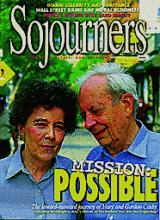My passion for oral history stems from the delicious thrill of hearing the hidden story. I adore listening to my grandma's tales of life in the Australian outback. Farming during the Depression was hard. Grandma's family survived by hiring immigrants to clear the paddocks. The timber was then exported, as railroad sleepers, to South Africa.
While attending university, I learned that Australia denied work to immigrants during the Depression, and I recalled grandma's stories. Government inspectors arriving at the farm were given a bottle of whiskey, and they would fill in Anglo-Saxon names for all the immigrants on the job! At its root, the practice of oral history is a refusal to let the official version be the sole standard of history.
Journalist and author Studs Terkel understands the subversive nature of oral history. His latest book, My American Century, is a "quasi-anthology" of his eight oral journals. It combines memories about the Great Depression and World War II, as well as reflections on the American Dream and the nature of work.
Terkel freely admits that the possessive pronoun in the title "reflects...a personal view....I have tried for as much balance as possible, yet objectivity...has escaped me." This is obvious from a cursory glance, which shows that only 12 of the 47 histories come from women. However, the oral testimonies that do make it into this collection offer remarkable insight into the lives of ordinary Americans and confound the official truth about America.
Read the Full Article
